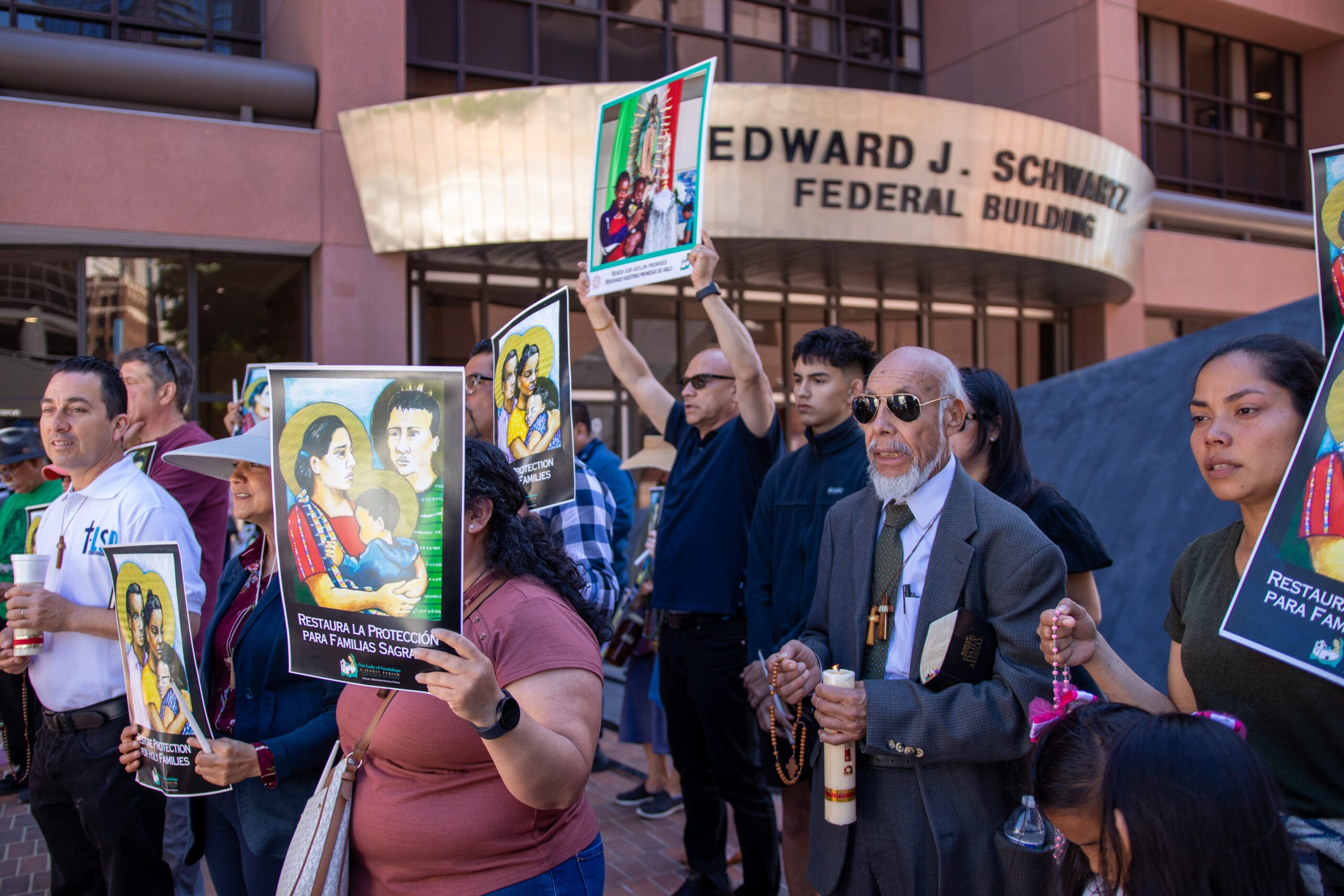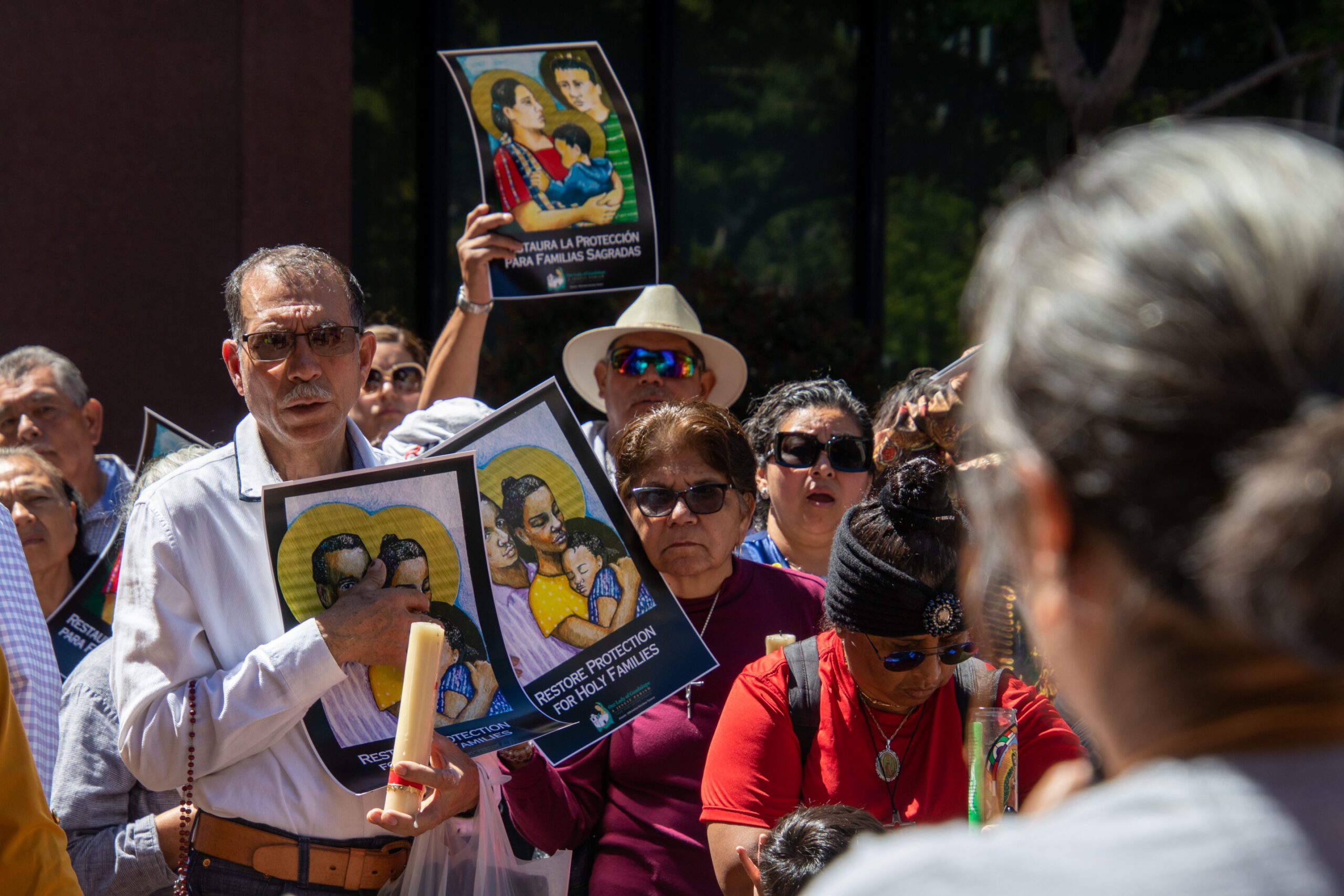By MegAnne Liebsch
May 12, 2023 — Last Sunday, 150 parishioners filed out of mass at Our Lady of Guadalupe parish and hopped onto the trolley toward downtown San Diego. With rosaries, candles and protest banners in hand, they reconvened in the plaza of a federal building complex where they began a nine-day novena calling for the restoration of asylum at the U.S.-Mexico border.
“We have left our church because it’s not enough just to pray in the confines of our church, but we need to put our bodies where are hearts are and lift our voices, so they can be heard and be seen,” said Our Lady of Guadalupe pastor, Fr. Scott Santarosa, SJ.

This novena is part of a series of actions organized by Jesuit organizations across the country to coincide with the end of the pandemic-era Title 42, which allowed the U.S. to expel most migrants without any opportunity to request asylum. Although the policy ended, the Biden Administration has instituted new restrictive asylum rules to take its place. Beginning May 12, these new regulations will make it much harder to obtain asylum for most people fleeing persecution.
In response, Jesuit ministries across the U.S.-Mexico border mobilized through prayer and protest. While Our Lady of Guadalupe parishioners gathered in downtown San Diego, across the country, in Philadelphia, the Jesuit parish Old St. Joseph’s hosted a prayer vigil in solidarity. At the global level, international Jesuit networks issued a statement warning that the recent swathe of migration restrictions across the Americas create “a dehumanizing process.”
Organizations such as Kino Border Initiative (KBI) and Jesuit Refugee Service USA witness firsthand how exclusionary policies place migrants in repeated danger.
With her husband and daughter, Iris fled gang violence in Guatemala. “At each step of the journey, officials have treated us horribly,” she says. After suffering violence and harassment at the hands of Mexican officials, Iris and her family attempted to cross into the U.S. They were picked up and interrogated by Border Patrol. At one point, her daughter broke down in tears, saying to one of the agents, “Surely you don’t have kids. That’s why you speak to us like this.”

The family’s possessions were confiscated, and they were detained for two days without access to a lawyer. Under Title 42, Border Patrol deported Iris and her family to Sonora, Mexico, where they encountered KBI. They have now been stuck in Mexico for over a year, still fearing for their safety.

“We are not safe. Three times, people from the gangs in Guatemala have searched for us in Mexico,” Iris says. “The reason we are still in harm’s way, vulnerable to these people, is because of the U.S.’s unfair policies. It is because agents rejected us and didn’t even hear our claim to asylum. They reject people seeking protection, even if we are fully within our rights.”
The Administration’s new asylum rules will only compound the threats facing asylum seekers. Under these new policies, access to the asylum system is more complex and dangerously restrictive, with many being returned to Mexico or deported to their home countries, subjecting people like Iris to further jeopardy.
At Sacred Heart Church in El Paso, where the Jesuits run a migrant shelter out of the parish gym, recently arrived migrants tell Fr. Daniel Mora, SJ, that they are fleeing violence in their home countries and the gang violence they suffered while waiting in Mexico. During a mass last week, he prayed for immigration policies that welcome and protect people. “May the asylum promises of this country be renewed,” Fr. Mora says.
MegAnne Liebsch is the communications manager for the Office of Justice and Ecology at the Jesuit Conference of Canada and the United States. She holds a master’s in media and international conflict from University College Dublin and is an alumna of La Salle University. She lives in Washington, DC.



